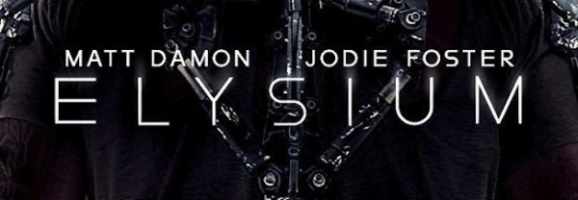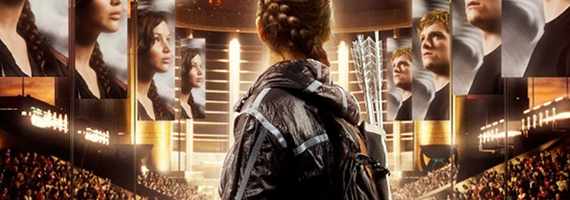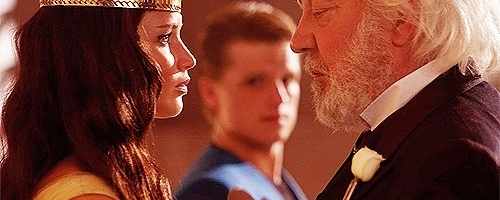Dystopias in Contemporary Hollywood: A Young Adult Revolution
A small while ago you would be forgiven for wondering if the dystopian genre was shuddering to an end. These kind of dystopias – be it due to nuclear apocalypse, plague, or totalitarian governments – had generally been relegated to the edges of culture, but in those edges had arguably perfected itself in the past few years. In 2013 alone, Margaret Atwood finally completed her wildly popular Oryx and Crake trilogy with the beautiful MaddAddam, whilst the release of The Last of Us was hailed as the ultimate depiction of post-apocalytia. However 2013 was also the year that Hollywood figured all this out and appropriated it as its own. This was not a reprisal of the fairly epic dystopian classics from the 1970s (Logan’s Run, Soylent Green). As with most things in recent years, Hollywood treated the genre like a teenage boy on a first date, awkwardly grabbing the parts it thought it should and leaving everybody fairly unimpressed.

Of the dystopias that emerged in 2013, Elysium probably had the most potential. With big stars Matt Damon and Jodie Foster, promises of smart social and political commentary, along with an excellent viral advertising campaign (it’s better up there) it looked to be the big-budget incarnation we’d never needed, but would appreciate anyway. Sadly, with a cry of “it’s set in the future, we can do what we want!” the film worked in broad strokes with various plot holes. It has been met with a lukewarm reception. The film itself is very pretty and, for a big-balls action film, it’s fine, but the most satisfying part of viewing an alternative world not so unlike our own is the fine details. Any oversight in these details cause the whole facade to unravel, and claiming that someone whose face has been entirely and graphically blown off on-screen to still have brain activity is a mess.
It’s not just Elysium that fell a little flat. 2013 also brought us Oblivion and The Purge, both of which investigating pretty interesting looking dystopias, but didn’t seem to deliver what they promised. Oblivion, with huge names Tom Cruise and Morgan Freeman, looked absolutely awesome on paper (and in advertising). But, like Elysium, the reviews weren’t exactly raving and the film made just over $89million in the US. This may seem like quite a lot, but it means that the universally panned The Lone Ranger was much more successful than this supposed massive blockbuster. The Purge didn’t fare any better, taking only $64million (although there is a sequel in the works already).
One thing Hollywood did do right was the adaptation of The Hunger Games. The first Hunger Games book came out in 2008 and the first film in 2012 which started a slowly rolling stone which has definitely gathered moss. The success of the films is indisputable. Hunger Games star Jennifer Lawrence is currently Hollywood’s highest paid actress and is seemingly universally adored by the internet – a feat that’s very difficult to achieve. The first Hunger Games film grossed over $690million worldwide whilst the second, which is still in cinemas, is edging up to $800million.

The Hunger Games has come up against controversy in that the story has the same central event as Battle Royale, a Japanese book-then-film from the late ’90s. However the two use this form of televised battle and death to satirise two completely different issues, or at least have been interpreted as such. The satire within the Hunger Games is no secret. Watching the desperate suffer under constant surveillance for entertainment whilst an audience hope for fights and tension is normal; the stark and painful difference between those who can afford anything and those who can afford nothing is so accepted that watching Katniss’ disgust at the overindulgence of the rich is jarringly familiar. In the Hunger Games the smallest crime is met with the highest punishment – for the unexceptional individual. In a world where people who hang a glittery Hunger Games-themed poster as a peaceful protest are charged with terrorism, a dystopia like this becomes even more relevant.
So what’s next? Like it or not, The Hunger Games has changed everything for the next pop culture trend. Where Twilight brought us a thousand supernatural romance films based on Young Adult fiction, it seems the Hunger Games will do the same for dystopias. Bloomsbury recently opened their doors to submissions of Young Adult novels, dystopias in particular. Variety called Divergent – a YA dystopian novel that is coming to the silver screen this March – social media’s most anticipated film for 2014, suggesting that this new genre is just getting started. The new now is looking for actual heroes (who are, seemingly, often young women) whose interests are helping society, rather than accidental anti-heroes (who are usually grubby blokes) that end up saving the world without really realising or caring. If 2013 showed Hollywood that they’ve lost the art of science-fiction, it sure as hell surprised everyone by proving it isn’t just for grown-up men looking for Halo: The Film.

The hope here is that this new trend will be much less disturbing than millions of teenage girls wanting to bang dead people, but there’s much more to it too. Donald Sutherland, who plays President Snow in the Hunger Games films, said in an interview with The Guardian that he wants The Hunger Games to stir up a revolution, and he might be right on the mark. Dystopias, as a rule, generally expose the fears of a society without explicitly pointing at them, such as Fahrenheit 451‘s examination of censorship written during the McCarthy era where censorship was a big deal. The Hunger Games shows us a 1% vs the 99% in an exaggerated, but still very recognisable, way. In the real world, any kind of dissent against this 1% is becoming outlawed (“occupational protest” is currently illegal on University of London campuses) and apparent police brutality is purportedly overlooked. Sutherland argues that what Western society needs now is a revolution, and if that’s inspired by a wildly successful Hollywood franchise then who are we to judge?
YA dystopias seem to draw popularity because they encourage a questioning of the norm. Sure, in Elysium Matt Damon’s character wasn’t a huge fan of the mass oppression, but he didn’t question it. In fact, the whole film is set into motion by his own selfish desire to personally survive, and (SPOILER!) he only ends up “saving” society kind of by accident. The Hunger Games, and evidently Divergent and perhaps further, has protagonists questioning authority. These dystopias may be cashing in on what many seem to dismiss as fangirl-phenomena, but if they have any of the satirical force of the Hunger Games we will possibly – finally – have a revolution on our hands.
What do you think? Leave a comment.











I remember seeing The Purge in theaters, expecting to be terrified. In actuality, I wasn’t afraid of the actors or the storyline, but of the idea that someone (a writer) had thought of this solution to ending crime. Today, people are so geared to creating “perfect worlds” that they don’t realize what a mess it can become, especially when it comes to morals and the way we look at them.
I don’t think dystopian societies are something that will ever be less-than-appealing to everyone. In fact, seeing as though young adults are reacting differently to each element introduced (zombie apocalypse, end of humanity, or what have you), I would assume that the genre is growing stronger, as the author suggests as well. I think the examples given are piss poor, however, only because I can think of so many other books and movies that young people could gravitate towards and not rated poorly in terms of content and structure. “The Hunger Games” series is one thing – I can’t judge but I only have heard good things, but “Elysium” and “Oblivion” were some of the worst movies I’ve ever watched. Maybe it’s the allure of a “perfect society” and teen angst and rebellion that kids are so into nowadays. I’d say give them Sean Murphy’s “Punk Rock Jesus”; it’s the perfect dystopian graphic novel.
Society is working very hard to suppress the thinker; we as humans tend to operate in the same manner as energy – following the path of least resistance. Society will resist the thinker, but furthermore society will resist the thought (offspring of the thinker).
I have never understood why anyone would want to read or see a movie that was sad or depressing. I always want to see a comedy. I think perhaps dystopia’s may be more plentiful now (and thank you for causing me to look up the word “dystopia”) because we live in a big dystopia now.
(Funny, the spell-check here hasn’t recognized “dystopia”)
Interesting article. Perhaps Matt Damon was portrayed as a regular Joe that didn’t question mass oppression, so that we other regular Joes might realize that questions need to be asked. Maybe we’re all a little ignorant of our surroundings and watching Elysium may open our eyes. Jennifer Lawrence on the other hand might be harder to identify with because, whether she wants to or not, she is leading a revolution. In other words, I think Damon as a survivor is a little more relatable than Lawrence as a revolutionary leader.
The dystopia has always been a fun topic to tackle, but the Hollywood versions of the distopic often end with some sort of fix or resolution (a la “Elysium”). The one honest factor in the zombie-apocalypse distopia is that it was impossible to repair, and that, at best you could survive. For example, “Battle Royale” operates quite well as an extended metaphor for the competition young people have one another for a successful future (though its culturally meant to resonate with Japanese audiences, the parallels for Millenials are obvious), and the ending has no fanfare, celebration or joy. Unfortunately, Western movies (like “I Am Legend”) take the distopian source material and butcher it to be completely unrecognizable.
Distopian movies are the Hollywood salve people take in to believe everything will be alright, when in reality everything is totally f*cked. These movies aren’t really distopian: they’re more like topias-in-flux.
Remember Running Man? With Arnold Schwarzenegger? Would you consider that to be a precursor to things like Battle Royale and Hunger Games? Why does no one want to talk about Running Man? I mean, besides the obvious reasons.
I think that films and TV are fairly good at reflecting the feelings of society (with the caveat of making money for Hollywood). I think the popularity of these films demonstrates people’s general dislike of the status quo and unrest over the growing inequality. The Hunger Games represents a possible future that is not too far out of reality if things continue as they are. You can’t keep the unhappy masses conveniently silenced forever.
The graphic novel/comic book world is also swinging for the fences with a multitude of post apoc titles. Lazarus, The Wake, Walking Dead (of course), East West, and Red Rover Charlie are just a few that come to mind. None of these titles fit the YA tag.
I enjoyed reading “The Hunger Games”, but I can’t say that any of the dystopian novels that have spawned from it are truly worthwhile. It seems to me that I’ve read about six different books in the past few months with the same premise, same characters, and same overall feel. It seems like every heroine is the same blend of strong yet vulnerable, caught desperately between the love of two deliberately dissimilar teens. I hope that the fascination with dystopian society takes a new turn, and that authors start to experiment more with the writing.
The Hunger Games has the most untenable society imaginable, based on ridiculous technology and absurd cruelty. But 1984 was no more realistic, and “Orwellian” has become an actual word in intellectual parlance, and what does that say about the work’s influence?
I just hope the next revolution isn’t as bloody as the last one.
I agree that The Hunger Games is one of the pioneers of dystopia in YA literature (or at least, it’s the series that made dystopia’s popularity explode). It seems we are moving out of the paranormal romance era brought about by Twilight and other books, and now dystopia is The Next Big Thing for YA books. And as more and more books are being adapted into movies, I’m sure this will only continue, especially with Divergent being released to theaters next month.
Great article! 🙂
I saw Elysium and I do agree that certain parts of the plot did not make much sense, specifically when the one character had his face blown off and was still alive. (I found that a bit far-fetched.) I also agree with the point you made about The Hunger Games being a turning point for dystopian YA to come, because of how the world is today. The youth can relate to the character’s struggles, even if what we go through in the real world is on a much smaller scale.
I think most of us have read Fahrenheit or Brave New World in high school already know a good deal about dystopia and totalitarianism. I’d like to say that Hollywood turning the concept into a teen soap opera is educating kids about these types of things, but probably not. I like the Hunger games movie a good deal, but as far as science fiction goes, it’s pretty flat.
‘As with most things in recent years, Hollywood treated the genre like a teenage boy on a first date, awkwardly grabbing the parts it thought it should and leaving everybody fairly unimpressed.’ – Amazing.
I agree with a lot of this article. I’ve always thought the idea of dystopia had a lot of untapped potential in cinema. I enjoy the Hunger Games for what they are; I don’t see them as a kind of revolutionary social document like some do, I don’t think that’s really their purpose. I think their purpose is to entertain whilst making its audience think, and in that both the books and films have succeeded.
I haven’t seen the Purge, but I heard it was terrible. Sad, because the premise had a lot of potential.
Good article!
I agree that it’s important for dystopian novels to pinpoint the sentiment of the time. While Elysium was fun (if a little confusing at times) it did not carry much relevant political weight. The Hunger Games may be aimed at Young Adult audiences, but I think they are more accurately tuned in to the fear of disproportionate wealth spreading, which is a concern most Americans have these days.
Your inclusion of Donald Sutherland’s ideas about revolution were interesting; I hadn’t heard those before. I think that there definitely seems to be (in Western Society) a tendency for people to weigh privacy against safety–often opting for safety. The Hunger Games certainly breaks down this binary to reveal just how unsafe a lack of privacy can be. If we allow the evolution of the panopticon to continue, we are enabling our viewers to have a hand in controlling us. It would be awesome if a young adult franchise like HG were able to spawn a revolution, but my hopes are low… perhaps I’m just being pessimistic.
Dystopian plots seem to have become popular in part because of the 2012 craze, but a greater part because of societal discontent.